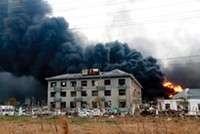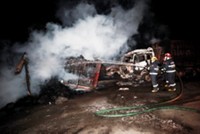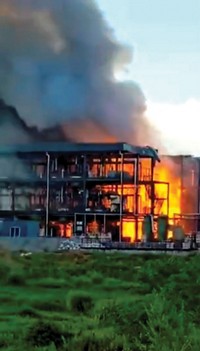Advertisement
Grab your lab coat. Let's get started
Welcome!
Welcome!
Create an account below to get 6 C&EN articles per month, receive newsletters and more - all free.
It seems this is your first time logging in online. Please enter the following information to continue.
As an ACS member you automatically get access to this site. All we need is few more details to create your reading experience.
Not you? Sign in with a different account.
Not you? Sign in with a different account.
ERROR 1
ERROR 1
ERROR 2
ERROR 2
ERROR 2
ERROR 2
ERROR 2
Password and Confirm password must match.
If you have an ACS member number, please enter it here so we can link this account to your membership. (optional)
ERROR 2
ACS values your privacy. By submitting your information, you are gaining access to C&EN and subscribing to our weekly newsletter. We use the information you provide to make your reading experience better, and we will never sell your data to third party members.
Safety
Safety And The Industry's Image
Globalizing chemicals and ensuring safety are big goals that may conflict
by Jean-François Tremblay
May 7, 2007
| A version of this story appeared in
Volume 85, Issue 19

In recent years, two major themes in the chemical industry have been image improvement and internationalization, particularly as the industry ventures into China. The catch is that as more firms build and operate plants in countries where safety and environmental standards are loosely enforced, the image of the industry will become harder to improve.
It's human nature to do no more than what is required. So one would hope that managers of chemical plants are exceptional people who voluntarily go beyond the regulatory standards. But history shows that, too often, people and their companies try to get away with poor operational standards.
Most of those familiar with the 1984 tragedy in Bhopal, India, where a gas leak from a Union Carbide plant killed thousands of people, agree that the accident could have been avoided if the plant had been operated in accordance with its own safety standards. It was not, and the government was not checking.
Trevor Kletz, a visiting professor of chemical engineering at Loughborough University, in England, and the author of several authoritative books on plant safety, says the tragedy showed that a plant operated abroad must not be managed by local staff implementing local standards. "When I was working at ICI, our plants in India were regularly audited for their compliance with global standards; their safety performance was as good as it is in the U.K.," he says.
The March 2005 explosion at BP's Texas City, Texas, refinery provides another and more recent illustration of a corporate attempt to get away with lax safety management. The U.S. Chemical Safety & Hazard Investigation Board (CSB) concluded that "organizational and safety deficiencies" at BP were the root cause of the accident that killed 15 people. The company was aware that the blowdown drum involved in the accident was unsafe. And yet, Amoco executives who ran the plant until 1998 had successfully argued with government inspectors that there was no need to replace it.
In March, CSB released its report on a deadly 2004 accident at a polyvinyl chloride plant in Illinois. The agency found that managers at the Formosa Plastics facility knew of, but ignored, the hazard posed by a critical valve that triggered the accident.
In developed countries like the U.S., accidents that are the result of such managerial laxity are rare. In China, the official media reports industrial accidents involving chemicals almost every day. Chlorine containers leak and residents have to evacuate. Rivers are contaminated when drums of toxic materials fall from trucks. Workers die when they are overcome by toxic fumes. And facilities, of course, blow up.
In India, the number of accidents reported by the media is not as large. But in Vapi, an industrial estate north of Mumbai, it's not difficult to find chemical plants that were abandoned after an explosion or a fire. The rivers of Vapi run red and green from untreated dye-bearing waste.
There are comprehensive regulations in China and India, but they are enforced unevenly and often after the fact. When a Jilin Petrochemical plant in northeastern China exploded in November 2005, it leaked benzene into the Songhua River and contaminated the water supply of Harbin, a city of 4 million. It was also an international incident because the Songhua becomes the Amur after it crosses into Russia.
This is the main, and perhaps the only, reason that the State Council, China's highest government body, became involved in this accident. The official Xinhua News Agency reported last November that the State Council had ordered punishment of executives from PetroChina, owner of Jilin Petrochemical, and government officials it had found responsible for the accident.
The international chemical industry is making a determined effort to improve operational standards worldwide with the advancement of the Responsible Care initiative. To comply with Responsible Care, companies now have to seek a third-party verification of their health, environmental, and safety practices.
Ideally, Responsible Care could take the place of local authorities in enforcing high operational standards in the chemical industry, wherever the plants may be located. But things are unlikely to turn out so neatly. In countries where large reputable companies dominate the trade associations, Responsible Care has worked well to raise the operational standards of smaller and less reputable chemical firms, Kletz says. But he adds that Responsible Care is not a government; it cannot force companies to do anything.
Earlier attempts at industrywide self-discipline are not encouraging. In 1997, Japan's Nuclear & Industrial Safety Agency decided to begin auditing safety reports it received from companies instead of directly conducting the inspections. In 2003, the agency found that several oil refiners and chemical producers were making up data they were supposed to be gathering during their plant self-inspections.
The many global chemical companies that operate in developing countries under standards that are much higher than the local ones are worthy of admiration. But some companies that build plants in countries where inspectors don't actually inspect will no doubt become lazy. Until regulations regarding plant operations are better enforced in China and other developing nations where the industry is expanding, image improvement will continue to be a struggle.
Views expressed on this page are those of the author and not necessarily those of ACS.





Join the conversation
Contact the reporter
Submit a Letter to the Editor for publication
Engage with us on Twitter